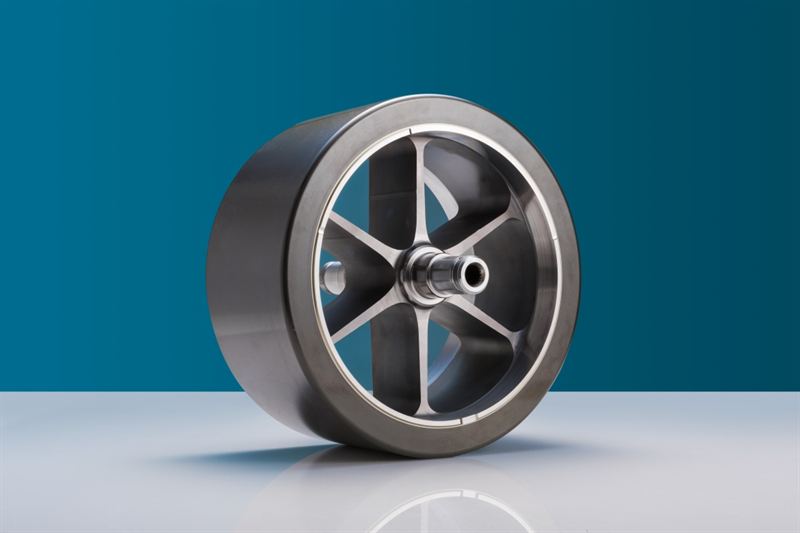Flywheel hybrids promise blend of high performance and low CO2 emissions to satisfy demands of drivers and future legislation

LCV2015 Low Carbon Vehicle conference hears of cost-effective approach to 2025 EU target
10th September 2015... Leading UK low carbon vehicle technology engineering company, Torotrak Group, today shared its vision for a high performance, low emissions future with visitors to the UK’s foremost low carbon vehicle event.
Speaking at LCV2015, Torotrak Chief Engineer, Dr Andrew Deakin detailed how the company’s Flybrid® Kinetic Energy Recovery System (KERS) is one of the exciting powertrain opportunities offering the ability to meet the proposed 2025 EU target of 70gCO2/km while remaining a cost-effective option.
“By combining a high specific power KERS unit that ensures good acceleration with a small combustion engine for steady state power, even a high performance car could meet the proposed 2025 CO2levels and still remain exciting to drive,” explained Deakin. “Using KERS power of 200-250kW, we can deliver a hybrid vehicle that accelerates from 0-100 km/h in around 4 seconds, yet uses a downsized conventional engine with an output of as little as 30kW in order to minimise carbon emissions.”
The core elements of Torotrak Group’s KERS technology have already been proven in market sectors as diverse as buses, off-highway equipment and motorsport. A flywheel from the company’s new bus application, which is installed in a Wrightbus Streetlite currently undergoing trials with bus operator Arriva, is displayed at LCV2015 on the Advanced Propulsion Centre (APC UK) stand in Hall 3.
The durability of both the high speed flywheel itself and the clutched flywheel transmission (CFT) which maintains the correct speed ratio between the flywheel and the vehicle, has been demonstrated with an aggressive accelerating testing programme. Passenger car test programmes carried out in conjunction with vehicle manufacturers, including one with Volvo, have demonstrated significant potential for improvements in fuel economy and CO2emissions.
A flywheel system provides a unique combination of high power density and appropriate energy density, unlike other technologies used in hybrid vehicles. Fuel cells and chemical batteries provide high energy density with quite low power density, whereas supercapacitors achieve the opposite. Developments of the Flybrid KERS technologies have demonstrated that power densities can exceed 10kW/kg with more than 1MJ of energy storage available.
Torotrak cites mechanical flywheel hybrids as typically just a third of the weight and a quarter of the cost of an equivalent electric system, due to their use of familiar and easily manufactured components, and their inherent power density. Electric hybrids typically cost over 20 percent more than their conventional counterparts but, without the need for a high-voltage system and costly battery pack, this premium could be much reduced.
“It does require a change in mind-set to visualise a hybrid where the combustion engine contributes just a small proportion of the total power,” admitted Deakin, “But once you grasp the concept that a downsized and optimised combustion engine is an effective way to provide the average motive power requirement, while a high speed flywheel contributes most of the acceleration required with zero carbon emissions, the possibilities are immediately apparent.”
Dr Deakin was speaking during ‘Energy Storage and Electric Machines’ one of a number of seminar programmes at LCV2015, which was held 9th– 10thSeptember at Millbrook, Bedfordshire, UK. Deakin’s comments come just a week after Torotrak Group Business Development Director, Tobias Knichel, outlined the technical benefits and strong commercial case for Flybrid® KERS technology in buses in a presentation to the audience at the Institution of Mechanical Engineers-organised 2015 Bus and Coach Seminar in London, UK.
ends
About Flybrid® KERS
Torotrak Group’s Flybrid® Kinetic Energy Recovery System (KERS) is a market leader in the field of fully mechanical hybrid technology, using a high-speed flywheel to capture kinetic energy and decelerate a vehicle. This stored energy is then transferred mechanically back to the wheels and used to accelerate the vehicle, offering significant fuel savings by reducing the engine power required to accelerate. Torotrak has undertaken the design, development and testing of the technology from concept to production-ready and can support any new customer in understanding the benefits to specific vehicles and/or routes. The Flybrid bus technology won the SMMT Award for Automotive Innovation in 2014, being cited as a potential game-changer for the UK vehicle industry due to its affordability and low carbon credentials.
About Torotrak
Torotrak (LSE: TRK) is an innovator and supplier of low carbon vehicle technologies, focussing on mechanical solutions that increase efficiency and reduce CO2emissions in vehicles. These include the V-Charge variable-drive supercharger, a range of Torotrak gearless traction drive transmissions, and the Flybrid energy recovery system, which uses a mechanically-driven flywheel to capture kinetic energy during braking and efficiently return it to the wheels. The company’s engineering team works with proven, global tier one technology partners to provide a validated route from prototypes to production. Customers include major vehicle manufacturers and their suppliers in the light duty, heavy duty and off-highway sectors as well as leading motorsport teams. www.torotrak.com
Media Contact
Paul Chadderton at Market Engineering
paul.chadderton@m-eng.com
+44 (0)1295 277050
Torotrak Contact
Sophie Wragg, Marketing Associate
sophie.wragg@flybrid.co.uk
+44 (0) 1327 855190


